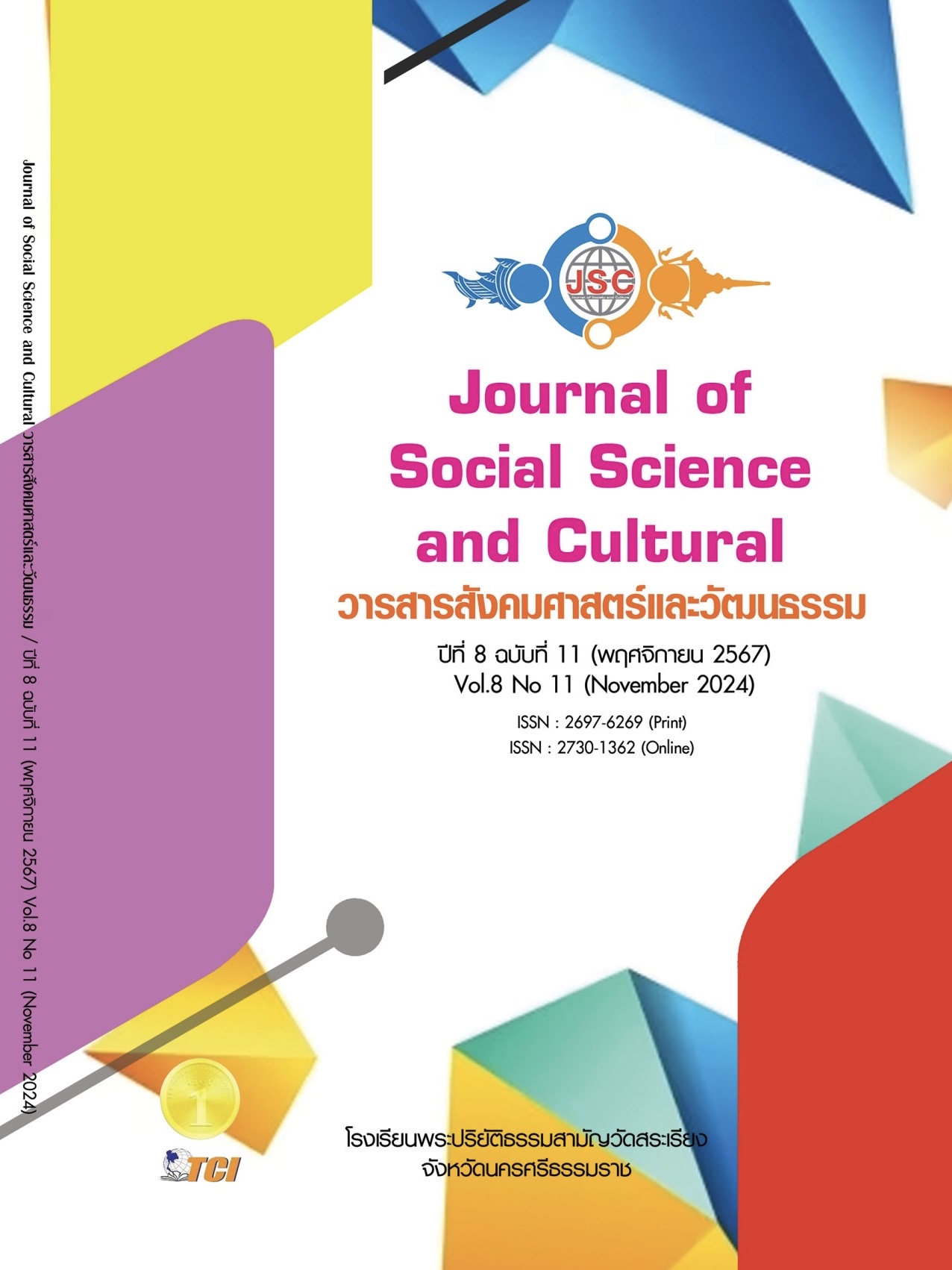CROSS-CULTURAL PSYCHOLOGY IN THE WORKPLACE: A CASE STUDY OF THAI-MYANMAR LABOR IN RETAIL BUSINESS SONGKHLA PROVINCE
Main Article Content
Abstract
The objective of this research is twofold: 1) study the conditions and challenges of cross-cultural work between Thai and Myanmar employees, and 2) propose guidelines for developing cross-cultural psychology in workplaces where Thai and Myanmar employees collaborate. The primary informants are retail business operators and Thai workers who work with Myanmar workers. The criteria for selecting informants include having worked with Myanmar workers in the establishment for no less than three years, the establishment must be registered with the state for employing foreign workers, and the informants must have a good understanding of working with Myanmar workers. A total of 15 informants were interviewed using semi-structured interviews. Data were analyzed using content analysis. The research findings indicate that retail business operators in Songkhla province have a good understanding of the cross-cultural aspects of Thai and Myanmar workers, both in terms of work and cross-cultural dimensions. The problems arising from cross-cultural work between Thai and Myanmar workers include communication differences, differences in values and behaviors, conflict management issues, and difficulties in adapting to organizational culture. These issues can lead to challenges in adapting to a diverse organizational culture. Approaches to developing cross-cultural psychology in the workplace can incorporate individual-level factors such as ethnic beliefs, cultural intelligence, and cross-cultural competence; interpersonal factors such as cross-cultural communication, workplace relationship building, and conflict management; and organizational factors such as organizational culture, leadership, and human resource management.
Article Details
References
ผู้ให้ข้อมูลสำคัญ E1. (11 ส.ค. 2567). จิตวิทยาข้ามวัฒนธรรมในที่ทำงาน. (ธภัทร บริรักษ์กิจดำรง, ผู้สัมภาษณ์)
ผู้ให้ข้อมูลสำคัญ E10. (15 ส.ค. 2567). จิตวิทยาข้ามวัฒนธรรมในที่ทำงาน. (ธภัทร บริรักษ์กิจดำรง, ผู้สัมภาษณ์)
ผู้ให้ข้อมูลสำคัญ E11. (15 ส.ค. 2567). จิตวิทยาข้ามวัฒนธรรมในที่ทำงาน. (ธภัทร บริรักษ์กิจดำรง, ผู้สัมภาษณ์)
ผู้ให้ข้อมูลสำคัญ E2. (11 ส.ค. 2567). จิตวิทยาข้ามวัฒนธรรมในที่ทำงาน. (ธภัทร บริรักษ์กิจดำรง, ผู้สัมภาษณ์)
ผู้ให้ข้อมูลสำคัญ E3. (12 ส.ค. 2567). จิตวิทยาข้ามวัฒนธรรมในที่ทำงาน. (ธภัทร บริรักษ์กิจดำรง, ผู้สัมภาษณ์)
ผู้ให้ข้อมูลสำคัญ E6. (13 ส.ค. 2567). จิตวิทยาข้ามวัฒนธรรมในที่ทำงาน. (ธภัทร บริรักษ์กิจดำรง, ผู้สัมภาษณ์)
ผู้ให้ข้อมูลสำคัญ E9. (14 ส.ค. 2567). จิตวิทยาข้ามวัฒนธรรมในที่ทำงาน. (ธภัทร บริรักษ์กิจดำรง, ผู้สัมภาษณ์)
ผู้ให้ข้อมูลสำคัญ M2. (11 ส.ค. 2567). จิตวิทยาข้ามวัฒนธรรมในที่ทำงาน. (ธภัทร บริรักษ์กิจดำรง, ผู้สัมภาษณ์)
ผู้ให้ข้อมูลสำคัญ M3. (12 ส.ค. 2567). จิตวิทยาข้ามวัฒนธรรมในที่ทำงาน. (ธภัทร บริรักษ์กิจดำรง, ผู้สัมภาษณ์)
Berry, J. W. et al. (2002). Cross-Cultural Psychology: Research and Applications. (2nd ed.). New York: Cambridge University Press.
Charoensukmongkol, P. & Phungsoonthorn, T. (2022). He Effect of Cultural Intelligence of Top Management on Pro-Diversity Work Climate and Work Attitudes of Myanmar Migrant Workers in Thailand. Equality, Diversity and Inclusion, 41(5), 760-777.
Cheawjindakarn, B. (2020). Qualitative Case Study Research Techniques. Academic and Reserch Journal of Liberal Art, 13(25), 103-118.
GLOBE. (2020). An Overview of the 2004 Study: Understanding the Relationship Between National Culture, Societal Effectiveness and Desirable Leadership Attributes. Retrieved July 14, 2024, from https://globeproject.com/study_2004_2007.html
Hofstede, G. (2020). Culture's consequences: Comparing Values, Behaviors, Institutions, and Organizations Across Nations. Thousand Oaks: Sage Publications.
House, J. R. et al. (2004). Culture, Leadership, and Organizations: The GLOBE Study of 62 Societies. Thousand Oaks: Sage Publications.
Joungtrakul, J. & Ferry, K. N. (2021). Data Management in Qualitative Research. Research Community and Social Development Journal, 15(2), 1-12.
Muenjanchoey, R. (2020). Working Culture of Myanmar and Thai People in the Thai Companies in Myanmar. Journal of Graduate Studies Valaya Alongkron Rajabhat University, 15(3), 151-166.
Muenjanchoey, R. (2022). Learning and Working of Thai Multinational Corporation Personnel in Myanmar. Damrong Journal of The Faculty of Archaeology Silpakorn University, 21(1), 141-164.
Muenjanchoey, R. (2023). Getting to Know Themselves and Yourself’: Understanding and Accessingthe Colleague Culture of Personnel in Thai Multinational Corporations that Invest in Myanmar. Journal of Liberal Arts, Thammasat University, 23(2), 839-857.
Nguyen, T. T. et al. (2023). Enhancing Workplace Performance through Cultural Diversity. Journal of Organizational Behavior, 44(2), 243-259.
Nimet, K. & Betül Şükür, F. (2023). Cross-Cultural Difference and Spirituality in the Workplace. in Özsungur, F. & Bekar, F. (ed.) Spirituality Management in the Workplace (pp. 103-129). Leeds, England, United Kingdom: Emerald Publishing Limited.
Numnuan, S. et al. (2021). Cultural Area of Burmese Migrant Workers in Surat Thani Province. Nakkhabut Paritat Journal, 13(2) , 20-31.
Phyo, M. (2021). Cultural Dynamics and Workplace Conflicts: A Study on Myanmar Workforce. Journal of Cross-Cultural Psychology, 52(3), 456-473.
Poo-Udom, A. & Lertbuasin, S. (2022). The Motivational Model of Job Performance for Five-Star Hotel Employees between Thailand and Myanmar through Cross-Cultural Management. Journal of Thai Hospitality & Tourism, 17(1), 77-94.
Rahman, A. & Tan, C. (2022). Cross-Cultural Training and Development in Multinational Companies. Journal of International Business Studies, 53(1), 101-119.
Ratchompoo, S. & Cadchumsang, J. (2020). Cosmopolitanism and Transnational Migration of Myanmar Migrant Workers in KhonKaen City. Journal of Liberal Arts Maejo University, 8(1), 137-155.
Sangsawat, J. & Oraphan, P. (2022). Intercultural Communication Factors Influencing Thai National Flight Attendants Overseas Cross-Cultural Adaptation. Sripatum Chonburi Academic Journal, 19(2), 115-129.
Smith, L. et al. (2022). Retail Workforce Diversity in Thailand: A Case Study. International Journal of Human Resource Management, 33(4), 789-805.
Suphaphon, N. (2009). Psychology for Cross-Cultural Work. Humanities Review, 19(1), 35-43.
Trompenaars, F. & Hampden-Turner, C. (2012). Riding the Waves of Culture: Understanding Diversity in Global Business. (3rd ed.). London: Nicholas Brealey Publishing.
Van Thac Dang, T., & Chou, Y.-C. (2020). Extrinsic Motivation, Workplace Learning, Employer Trust, Self-Efficacy and Cross-Cultural Adjustment: An Empirical Study of Vietnamese Laborers in Taiwan. Personnel Review, 49(6),1232-1253.
Yang, C. (2023). Motivational cultural intelligence and well-being in cross-cultural workplaces: a study of migrant workers in Taiwan. Employee Relations, 45(3), 743-761.


